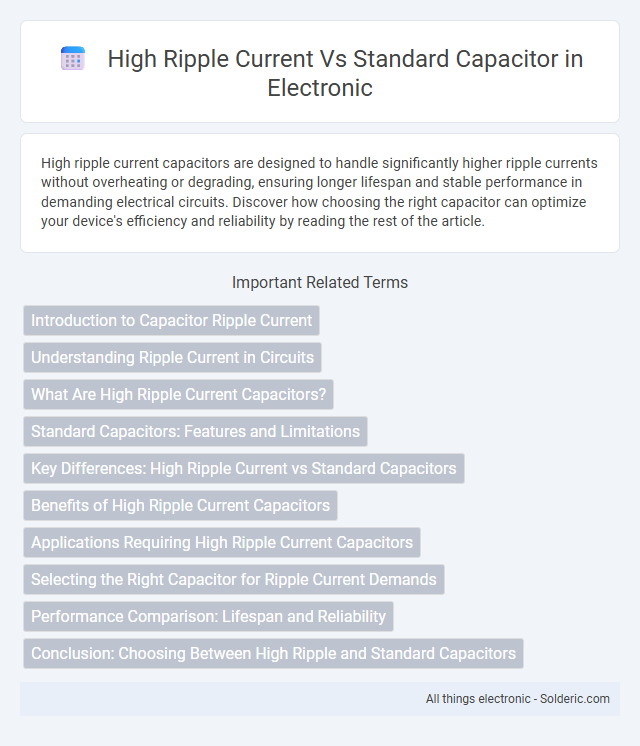High ripple current capacitors are designed to handle significantly higher ripple currents without overheating or degrading, ensuring longer lifespan and stable performance in demanding electrical circuits. Discover how choosing the right capacitor can optimize your device's efficiency and reliability by reading the rest of the article.
Comparison Table
| Feature | High Ripple Current Capacitor | Standard Capacitor |
|---|---|---|
| Ripple Current Rating | High, supports heavy AC ripple current | Lower, unsuitable for high ripple environments |
| Application | Power supplies, inverters, motor drives | General electronics, low-stress circuits |
| Thermal Performance | Enhanced heat dissipation, stable at high temperatures | Standard heat tolerance, prone to overheating under stress |
| Lifespan | Longer operational life in ripple-intensive applications | Reduced life when exposed to high ripple currents |
| Cost | Higher due to optimized materials and design | Lower, cost-effective for general use |
| Size | Often larger to handle thermal and electrical stress | Compact, designed for standard applications |
Introduction to Capacitor Ripple Current
Capacitor ripple current refers to the alternating current flowing through a capacitor during operation, generating heat that affects the capacitor's lifespan and performance. High ripple current capacitors are specifically designed with low equivalent series resistance (ESR) and enhanced thermal management to handle greater ripple currents without significant degradation. Your choice of capacitor must consider ripple current ratings to ensure reliability and efficiency in power supply and filtering applications.
Understanding Ripple Current in Circuits
High ripple current capacitors are designed to handle significant AC current fluctuations without degradation, unlike standard capacitors which may overheat or fail under the same conditions. Understanding ripple current in circuits is crucial because it directly affects capacitor lifespan and circuit stability, especially in power supply filtering and switching regulator applications. Selecting a capacitor with appropriate ripple current rating ensures Your circuit maintains performance and reliability under varying load conditions.
What Are High Ripple Current Capacitors?
High ripple current capacitors are designed to handle significantly higher alternating current fluctuations compared to standard capacitors, making them ideal for applications with rapid voltage changes or high-frequency switching. These capacitors feature enhanced thermal management and low equivalent series resistance (ESR), ensuring durability and stable performance under continuous ripple stress. Choosing high ripple current capacitors for your electronic circuits improves reliability, reduces heat buildup, and extends the lifespan of your components.
Standard Capacitors: Features and Limitations
Standard capacitors typically feature lower ripple current ratings, which limits their ability to handle high-frequency or high-current fluctuations without overheating or degrading prematurely. These capacitors often exhibit higher equivalent series resistance (ESR), reducing efficiency and potentially causing voltage instability in demanding applications. When your circuit requires sustained high ripple currents, relying on standard capacitors may result in reduced lifespan and compromised performance.
Key Differences: High Ripple Current vs Standard Capacitors
High ripple current capacitors are designed to handle significantly higher AC ripple currents, reducing thermal stress and increasing reliability in power electronics compared to standard capacitors. They feature advanced materials and construction techniques that enhance their ripple current rating, allowing for longer lifespan and better performance in high-frequency switching applications. Standard capacitors, while adequate for general use, typically suffer from higher heat generation and faster degradation under continuous high ripple current conditions.
Benefits of High Ripple Current Capacitors
High ripple current capacitors excel in handling greater electrical stress, leading to improved reliability and longer lifespan in demanding applications. Their ability to dissipate heat efficiently reduces the risk of overheating, enhancing overall circuit stability and performance. You benefit from minimized maintenance and downtime due to these capacitors' superior endurance under high ripple current conditions.
Applications Requiring High Ripple Current Capacitors
High ripple current capacitors are essential in power supply circuits, motor drives, and high-frequency inverters where continuous exposure to large current fluctuations occurs. These capacitors improve performance and lifespan by efficiently handling thermal stress and minimizing voltage ripple, unlike standard capacitors that may overheat or fail under such conditions. Your choice of high ripple current capacitors ensures stable operation and reliability in demanding applications like renewable energy systems and industrial automation.
Selecting the Right Capacitor for Ripple Current Demands
High ripple current capacitors are designed to withstand elevated AC current stresses that standard capacitors cannot reliably handle, ensuring longevity and stable performance in power electronics. Selecting the right capacitor for your ripple current demands involves evaluating the capacitor's ripple current rating, equivalent series resistance (ESR), and temperature tolerance to prevent overheating and premature failure. Prioritizing these parameters helps maintain circuit efficiency and supports reliable operation in applications like switching power supplies and DC-DC converters.
Performance Comparison: Lifespan and Reliability
High ripple current capacitors offer significantly improved lifespan and reliability compared to standard capacitors by efficiently handling larger ripple currents without overheating or degradation. Their advanced construction materials enable stable performance under fluctuating electrical loads, reducing failure rates and extending operational life in demanding applications. Selecting a high ripple current capacitor enhances your system's durability and ensures consistent performance in high-stress environments.
Conclusion: Choosing Between High Ripple and Standard Capacitors
High ripple current capacitors deliver superior performance in applications requiring frequent and significant current fluctuations, enhancing durability and reducing thermal stress. Standard capacitors are suitable for low ripple current scenarios, offering cost-effectiveness and adequate performance for less demanding circuits. Selecting between high ripple current and standard capacitors depends on the application's current load, thermal conditions, and longevity requirements.
High ripple current vs standard capacitor Infographic

 solderic.com
solderic.com